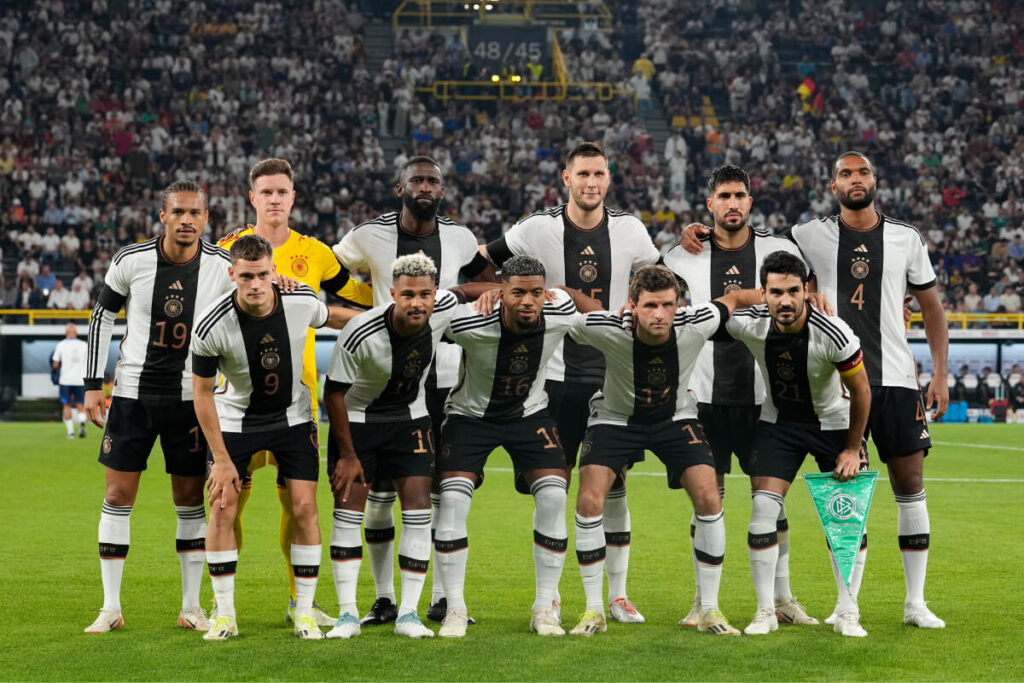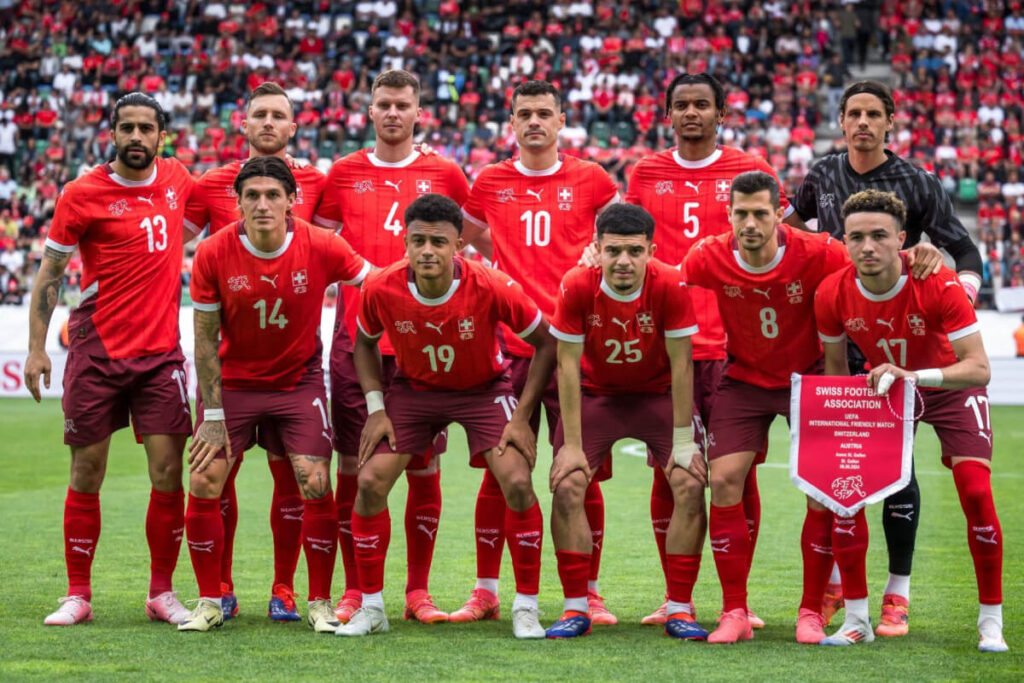The much-anticipated Euro 2024 Group A clash between Germany and Switzerland is set to be a thrilling encounter, pitting two of Europe’s most formidable teams against each other. With Germany playing on home soil and Switzerland eager to prove their mettle, this match promises to be a showcase of high-quality football, strategic brilliance, and raw passion.
Germany, the host nation, comes into this tournament with immense pressure and expectation. As three-time European champions, they have a rich history and a reputation to uphold. The squad, a blend of experienced stalwarts and emerging talents, is under the stewardship of coach Hansi Flick. On the other hand, Switzerland, often regarded as dark horses in major tournaments, have shown remarkable consistency and growth over recent years. Managed by Murat Yakin, they are a team brimming with confidence and tactical acumen.
Germany’s Approach:

Germany traditionally favors a high-pressing, possession-based style of play. Under Flick, they have embraced a dynamic 4-2-3-1 formation, which allows for fluid transitions between attack and defense. Manuel Neuer, the veteran goalkeeper, not only provides security between the posts but also acts as a sweeper-keeper, enabling the team to maintain a high defensive line.
In defense, Antonio Rüdiger and Niklas Süle form a solid central partnership, flanked by the energetic full-backs Joshua Kimmich and David Raum. Kimmich, often deployed as a right-back, can shift into midfield, allowing Germany to dominate the center of the park. The double pivot of Leon Goretzka and Ilkay Gündogan offers both defensive solidity and creative distribution, linking play with the advanced midfield trio.
The attacking midfield, consisting of Leroy Sané, Kai Havertz, and Serge Gnabry, provides pace, creativity, and goal-scoring threats from various angles. Timo Werner, the lone striker, uses his speed and movement to stretch defenses and create space for the attacking midfielders.
Switzerland’s Strategy:

Switzerland, under Yakin, employs a balanced 3-4-2-1 formation, which emphasizes defensive organization and quick transitions. Yann Sommer, the reliable shot-stopper, anchors a defense that includes the experienced Fabian Schär, Manuel Akanji, and Nico Elvedi. This three-man defense is crucial in providing solidity and allowing the wing-backs to push forward.
In midfield, Granit Xhaka and Remo Freuler form a robust partnership, with Xhaka orchestrating play and Freuler providing defensive cover. The wing-backs, Kevin Mbabu and Ricardo Rodríguez, are essential in both defensive duties and offering width in attack. The attacking duo of Xherdan Shaqiri and Ruben Vargas supports the lone striker, Breel Embolo, with Shaqiri’s creativity and Vargas’ pace being key elements in Switzerland’s offensive play.
Tactical Breakdown:
Germany’s Approach:
Germany traditionally favors a high-pressing, possession-based style of play. Under Flick, they have embraced a dynamic 4-2-3-1 formation, which allows for fluid transitions between attack and defense. Manuel Neuer, the veteran goalkeeper, not only provides security between the posts but also acts as a sweeper-keeper, enabling the team to maintain a high defensive line.
In defense, Antonio Rüdiger and Niklas Süle form a solid central partnership, flanked by the energetic full-backs Joshua Kimmich and David Raum. Kimmich, often deployed as a right-back, can shift into midfield, allowing Germany to dominate the center of the park. The double pivot of Leon Goretzka and Ilkay Gündogan offers both defensive solidity and creative distribution, linking play with the advanced midfield trio.
The attacking midfield, consisting of Leroy Sané, Kai Havertz, and Serge Gnabry, provides pace, creativity, and goal-scoring threats from various angles. Timo Werner, the lone striker, uses his speed and movement to stretch defenses and create space for the attacking midfielders.
Switzerland’s Strategy:
Switzerland, under Yakin, employs a balanced 3-4-2-1 formation, which emphasizes defensive organization and quick transitions. Yann Sommer, the reliable shot-stopper, anchors a defense that includes the experienced Fabian Schär, Manuel Akanji, and Nico Elvedi. This three-man defense is crucial in providing solidity and allowing the wing-backs to push forward.
In midfield, Granit Xhaka and Remo Freuler form a robust partnership, with Xhaka orchestrating play and Freuler providing defensive cover. The wing-backs, Kevin Mbabu and Ricardo Rodríguez, are essential in both defensive duties and offering width in attack. The attacking duo of Xherdan Shaqiri and Ruben Vargas supports the lone striker, Breel Embolo, with Shaqiri’s creativity and Vargas’ pace being key elements in Switzerland’s offensive play.
Key Battles
Midfield Dominance:
The midfield battle between Germany’s Goretzka and Gündogan against Switzerland’s Xhaka and Freuler will be pivotal. Germany’s duo will look to control possession and dictate the tempo, while Switzerland’s midfielders will aim to disrupt their rhythm and launch quick counter-attacks.
Full-Backs vs. Wing-Backs:
The clash between Germany’s full-backs and Switzerland’s wing-backs will be crucial in determining which team can dominate the flanks. Kimmich and Raum will need to balance their offensive contributions with defensive responsibilities, as Mbabu and Rodríguez are adept at exploiting spaces on the wings.
Attacking Threats:
Timo Werner’s movement and pace against Switzerland’s well-organized defense, led by Akanji, will be an intriguing contest. Similarly, Germany’s defense will have to be wary of Embolo’s physicality and Shaqiri’s ability to unlock defenses with his vision and creativity.
Form and Statistics
Germany’s Recent Form:
Germany entered Euro 2024 with a strong qualifying campaign, topping their group with a 63% possession rate and scoring 30 goals. Their attacking prowess is evident, but questions remain about their defensive solidity, having conceded some unexpected goals in the lead-up matches.
Switzerland’s Recent Form:
Switzerland also enjoyed a successful qualifying phase, highlighted by their defensive resilience, conceding only 8 goals. Their passing accuracy of 85% reflects a team comfortable in possession and capable of controlling games. However, their ability to convert possession into goals will be tested against stronger opposition.
Player to Watch
Germany – Kai Havertz:
Havertz’s versatility and intelligence make him a key player for Germany. Operating as an advanced midfielder, his ability to find pockets of space and link up play with the forwards will be crucial. Havertz’s knack for scoring important goals adds another dimension to Germany’s attack.
Switzerland – Xherdan Shaqiri:
Shaqiri’s experience and creativity are vital for Switzerland. Known for his ability to produce moments of magic, his vision and passing can unlock even the most stubborn defenses. Shaqiri’s performance will be central to Switzerland’s hopes of creating scoring opportunities.
Match Predictions
Given the strengths and strategies of both teams, this match is poised to be a closely contested battle. Germany’s home advantage and superior attacking options might give them the edge, but Switzerland’s defensive discipline and counter-attacking threat cannot be underestimated. A draw could be a likely outcome, with both teams scoring, but slight tactical adjustments or individual brilliance could tip the balance in favor of either side.
Conclusion
The Germany vs. Switzerland clash in Euro 2024’s Group A is more than just a football match; it’s a battle of philosophies, strategies, and wills. Germany, with their attacking flair and home support, face a well-drilled and confident Swiss side. This encounter promises to be a testament to the beauty and unpredictability of football, leaving fans eagerly anticipating every twist and turn.